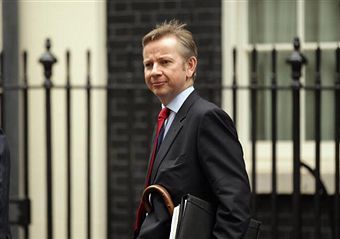 The Spectator has been a long-term fan of Michael Gove – indeed, we named him the
single best reason to vote Tory at the last election. His ‘free school’ reforms are laudable and the emphasis on improving standards is imperative. Under the previous government,
Britain slid down the international rankings of educational attainment. A tide of politically correct initiatives robbed teachers of their classrooms and discipline suffered. The post code lottery
under which state education operates sentences the poorest and most vulnerable in society to rot in under-funded sink schools. Reform is both a moral crusade and a necessity if Britain is to
continuing punching above its weight in the future.
The Spectator has been a long-term fan of Michael Gove – indeed, we named him the
single best reason to vote Tory at the last election. His ‘free school’ reforms are laudable and the emphasis on improving standards is imperative. Under the previous government,
Britain slid down the international rankings of educational attainment. A tide of politically correct initiatives robbed teachers of their classrooms and discipline suffered. The post code lottery
under which state education operates sentences the poorest and most vulnerable in society to rot in under-funded sink schools. Reform is both a moral crusade and a necessity if Britain is to
continuing punching above its weight in the future.
But reform cannot be delivered just at the education secretary’s whim. The opposition is entrenched, marshalled by well-drilled unions. It also has a psychological advantage: innovation breeds suspicion. State education is Labour’s natural territory. Many of its MPs were originally councillors who reached political maturity while running schools in local government. It is tribal, which explains why Ed Balls and Andy Burnham are so vehement and uncompromising in their denunciations.
Beyond the Parliamentary Labour Party, the teaching unions and local government disregard parents’ wishes and spring on dissenters: the fate of Katharine Birbalsingh is a case in point. At a cross-national level, the educational establishment (a corporation of both right and left and the local level) has resorted to attacking Gove personally: the ‘dogmatic bully’, ‘the pipsqueak of a man’, and ‘the high-handed, incompetent and unfair minister’ as Ed Miliband dubbed him this afternoon. These impulses have ensured that academies status, which would free schools from the financial control of local authorities, is rarely taken up.
Many on the right have hoped that Gove would institute real competition -the thinking being that competition will force failing schools to up their game because money from central government will follow pupils to successful schools. But, as far as I can tell, this White Paper does not allow that. Some of the insitutional inertia may be dispelled, but many argue that true competition can only exist when a profit can be made; that way, failing schools are priced out of the market. A pure market may be unconscionable for many, even on the right. But the White Paper doesn’t seem to allow even a limited market – which might have been achieved by maintained schools immediately by-passing local government and applying for funds directly from Whitehall, before the creation of the Education Funding Agency. Impetus and momentum is everything to radical reform, and Gove’s are unlikely to get airborne if local government retains control of funding at the moment of reform’s inception.






Comments